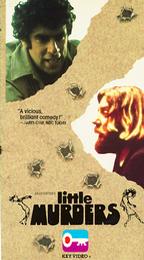FILM NOTES
FILM NOTES INDEX
NYS WRITERS INSTITUTE
HOME PAGE

 Little Murders
Little Murders
(American, 1971, 110 minutes, color, 35 mm)
Directed by Alan Arkin
Cast:
Elliott Gould . . . . . . . . . . Alfred Chamberlain
Marcia Rodd . . . . . . . . . Patsy Newquist
Vincent Gardenia. . . . . . . . . . Mr. Newquist
Elizabeth Wilson . . . . . . . . . . Mrs. Newquist
Donald Sutherland. . . . . . . . . . The Priest
Alan Arkin. . . . . . . . . . The Detective
The
following film notes were prepared for the New York State Writers
Institute by Kevin Jack Hagopian, Senior Lecturer in Media Studies
at Pennsylvania State University:
Jules Feiffer’s cruelly funny cartoon collection Sick, Sick, Sick was a landmark of the early 1960s. Its schnook everyman character, Bernard, was beset by pressures both internal (his status as a failed womanizer) and external (atomic fallout, racial division, the commercialization of American culture, the Talmudic intricacies of the hi-fi fad). Bernard seemed caught in a civilization which presented him with only two options—selling out or dying out. Feiffer’s cynically sad world anticipated Tales of the City and Maus as much as it did Doonesbury and Calvin and Hobbes; perhaps its only progenitor was William Steig’s anguished The Lonely Ones of 1942.
As the 1960s wore on, Feiffer’s warped vision shifted further to the Left, accommodating new sorrows and the weight they placed on his believably neurotic characters: Vietnam, the burning of the cities, the generation gap, a new cycle of consumer fetishes. By the 1970s, Feiffer was an institution, his cartoons a clear-eyed, bitter chronicle of a time that had come to believe that the light at the end of the tunnel was an approaching train.
Feiffer’s characters were so crisply articulated that the stage seemed a natural outlet for their psychic concertos of alternating panic and depression. A first stage adaptation of his work failed in 1967; after a successful European run, the play reappeared in 1969 in a triumphant production at Circle in the Square. The cast included young actors and new faces like Linda Lavin, Vincent Gardenia, Elliott Gould, David Steinberg, and Heywood Hale Broun.
In an age of elephantine musicals and threadbare revivals, the play Little Murders was an attempt by the off-Broadway stage to acknowledge the world just outside the theater doors, a world of increasing urban violence and alienation, a world in which the great middle-class verities (Family, Country, God, Television) had been hollowed out and left as broken idols in a cultural desert. When the production came to the screen in 1971 under the direction of Alan Arkin, it was part of the movies’ first tentative admission that their patrons, too, might live in a world rather distinct from that inhabited by Dolly Levi and Dr. Dolittle. (These were the years of grumpy, rebellious films like DRIVE; HE SAID; FIVE EASY PIECES; and EASY RIDER.) Like Neil Simon’s film THE OUT-OF-TOWNERS, LITTLE MURDERS is a marvelous essay in New York self-loathing. Here, the city is an allegorical landscape where citizens cower behind steel shutters, the cops are twitching basket cases, and existential crises multiply like weeds in a Bronx cemetery. This must be the film that showed David Lynch he was sane, after all.
"Little murders," it turns out, are like an earlier age’s "little men"—unremarked-upon fixtures of a vicious urban terrain, deaths that happen so casually and frequently that they have become more than anonymous; now, they are headaches, fountainheads of paperwork and generators of pointless investigations, consumers of what precious energy the city has left. Overwhelmed by garbage strikes, race wars, sniper fire, electrical outages, and John Lindsay, the Newquist family tries gamely to welcome suitor "Alfred Chamberlain" (Elliott Gould) into their home, but the romance between Alfred, an angst-ridden artist, and "Patsy Newquist" (Marcia Rodd) is ill-starred. As the couple play out their hapless romance in the periodic darkness, punctuated by "Mr. Newquist’s" (Vincent Gardenia) dystopic ravings and "Kenny Newquist’s" (Jon Korkes) gay nihilism, the whole damn thing inflamed by "Mrs. Newquist’s" (Elizabeth Wilson) sunny obliviousness, we get the creepy feeling we’re watching the end of humanity as scripted by the writers of Leave it To Beaver, a picnic on the edge of eternity’s precipice, with ants.
— Kevin Hagopian, Penn State University
For additional information, contact the Writers Institute at 518-442-5620 or online at https://www.albany.edu/writers-inst.